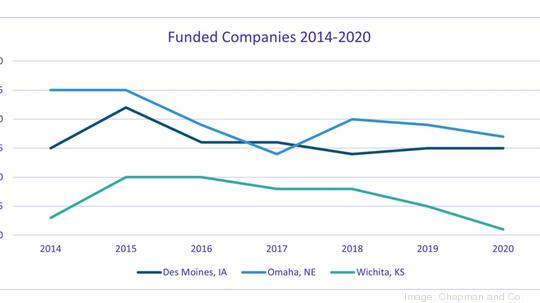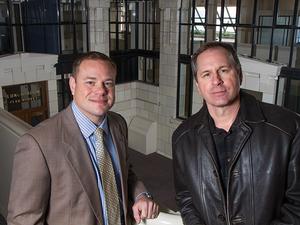
An Omaha consulting firm hired by the Greater Wichita Partnership late last year has delivered its findings on how to create a more deliberate, strategic approach to growing Wichita's entrepreneurial ecosystem.
The 50-page report from Chapman and Co. concludes the Partnership and the broader Wichita community should make entrepreneurs and their startups a priority, and outlines some of the systems that can best support them.
"The ecosystem framework is built on the idea that entrepreneurship flourishes when communities find, empower, and surround their entrepreneurs with key systemic support. This cannot be understated," the Chapman and Co. report reads. "Startups are built by singular individuals and small teams. Thus, the most important activities that a community seeking growth can undertake are to identify, empower, and support its entrepreneurs."

Tom Chapman, who founded his consulting business in 2016 and authored the report, writes there are bright spots when it comes to Wichita's existing entrepreneurial ecosystem, noting examples like NXTUS, Founder's Grove, Groover Labs and Network Kansas.
There are a few ways to measure Wichita's current status.
Wichita’s Small Business Administration loan rate, for example, is in line with the other markets to which it is compared, the report says. This suggests access to capital for main street-type businesses is good.
Wichita's representation on the Inc. 5000 list, though, is not strong. On the list of fasting-growing private companies, peer communities average around 13 or 14 companies a year per MSA, but Wichita only had two rank in 2019 and four in 2020.
And when it comes to the number of companies funded by venture capital and angel groups, Chapman and Co. found Wichita performs relatively low compared to its peer communities. Omaha and Des Moines, the findings say, outperform Wichita by almost two times every year over the last seven-year cycle.

In other words, there's work to be done.
Based on interviews with local entrepreneurs, the firm says it found many business owners who feel isolated and question their ability to grow a great company in Wichita. They said being heard is what they desire most.
"Sometimes their voices are indistinct or unclear, and thus the message is difficult to ascertain, even to the entrepreneurs themselves," the report reads. "This is why Wichita must work hard to communicate more effectively with each other, stay aligned around some fundamental goals, and find, prioritize, and listen to more actual entrepreneurial voices."
Four things, Chapman writes, are critical to bolstering support for new startups: financial capital, connecting activities, a knowledgeable community and structure.
Financial capital
According to the report, communities need a robust stack of capital providers — as funding is always the challenge for entrepreneurs. Usually this includes non-dilutive grants and competition awards, traditional and nontraditional banking loans, and early-stage equity capital.
Chapman and Co. points to a number of examples around the country, like a grant program in Kentucky that helps pay for the application, which can take up to four weeks of work time, and provides additional financial support to successful applications. Universities host business plan competitions and award grants to the winning team of students. Microloan programs aim to help business owners get started with small loans that may not qualify under traditional bank lending guidelines.
The consulting firm reports that a $20- or $40-million influx of capital over seven years in Wichita-based companies can produce numerous well-financed companies that can help facilitate regional capital connections, future angel development and other efforts that stem from company creation.
Connecting activities
One consistent flaw in many communities’ efforts is how a person new to the entrepreneurial ecosystem can enter, and it's not always an event or a venue.
The solution is to build connections, both personal and digital, to entrepreneurs, and telling, and repeating, their stories. These relationships lay the foundation for leadership across neighborhoods, demographics, industries and social circles, the reports says.
Knowledgeable community
It's critical to build a common language or lexicon for entrepreneurship to avoid the kind of short-hand terms and topics that often confuse new entrants.
Structure
Universities, nonprofits, policymakers and venue owners make up the structures that contribute to entrepreneurial success. The report suggests the Wichita region should step into the public policy breach and help to strengthen the key programs that grow the startup ecosystem.
Other findings
Chapman and Co. believes it is necessary for Wichita to jump from approximately five first fundings per year to 20 per year. This involves some capital, and possibly some support structure changes, maybe an accelerator or other company creation mechanism.
In the area of diversity, inclusion and equity, it appears likely that Wichita will continue to become significantly more diverse over the coming decades, the report says, so more should be done to support minority talent.
Wichita should also lean into its strongest areas, particularly aerospace. Chapman laid out a four-step actionable plan:
- Listen to the existing startups in the U.S. that are already working in aerospace and defense.
- Communicate with these startups. Understand what they have but also what they need and cannot find.
- Build toward hard-to-solve problems that other communities cannot solve.
- Establish programs, competitions, etc. that begin to reveal the creation of the startup aerospace industry in Wichita.
As the economy evolves in the 21st century, "Wichita has a unique opportunity to lead in key industries – including aerospace and smart manufacturing," the report states. "In short, Wichita has a path, but, as with most things that signal greatness, it will be a difficult one. It requires courage to have a vision and work towards it for a full generation."









